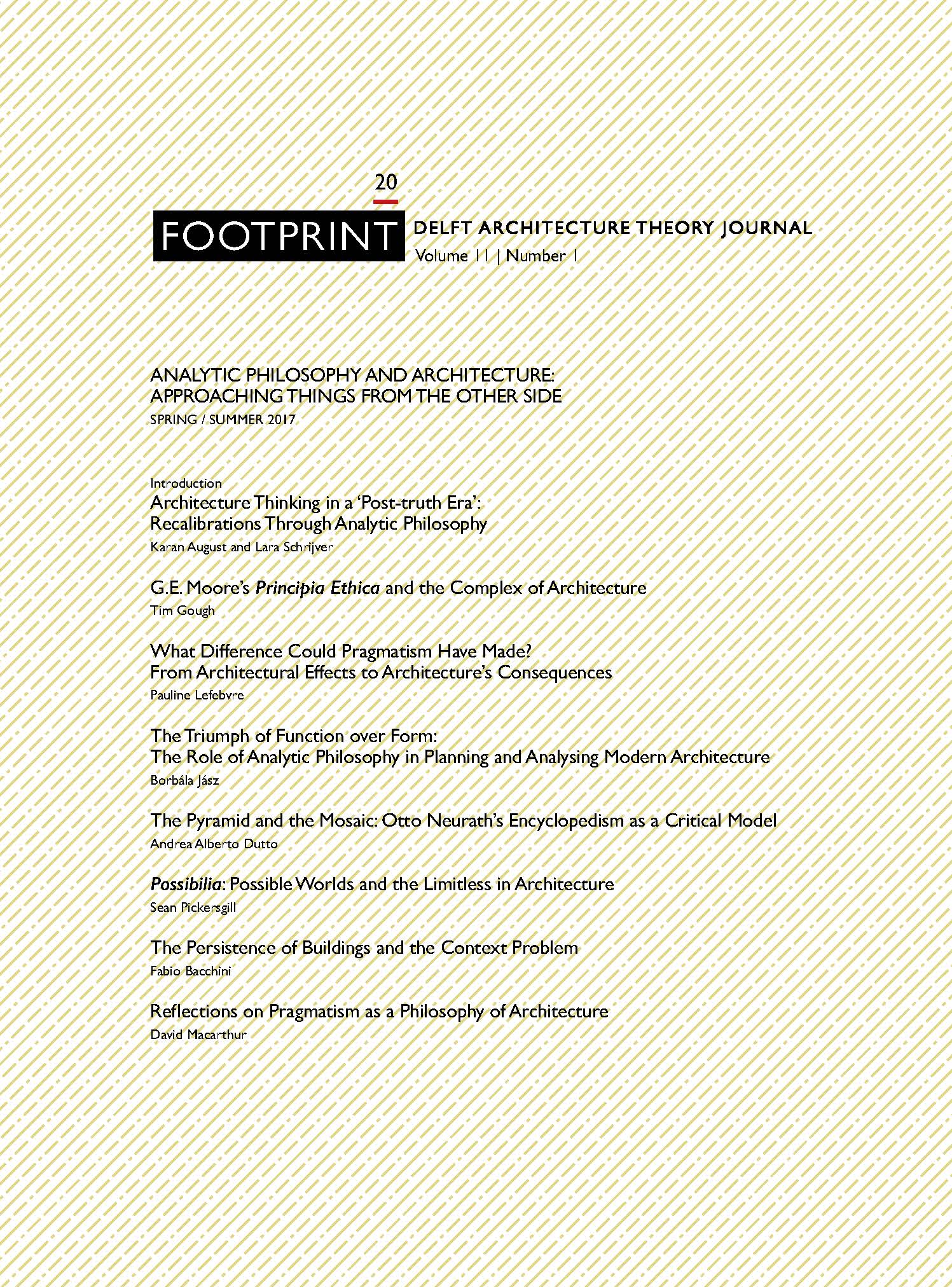G.E. Moore’s Principia Ethica and the complex of architecture
DOI:
https://doi.org/10.7480/footprint.11.1.1182Abstract
G.E. Moore’s Principia Ethica of 1903 is generally regarded as a starting point of analytical philosophy. It’s concern with analytical propositions, the pushing of analysis to an end point, its rigorous style, the clarity of its arguments and the precise demolition of the less-than-rigorous work of preceding philosophers provided a template for how twentieth century Anglo-Saxon thought might forge its own path.
This paper argues that Moore’s notion of the “organic whole”, together with his concern for the goodness of human intercourse, are inherently architectural thoughts with implications for a non-formalist theory or ontology of architecture. Moore’s emphasis on the intermixture of the work and the subject, his interest in the material quality of things, his championing of the possibilities of valuing the apparently mundane if seen within a broader context, his doubts about representational art compared to environmental beauty, and his valuing of the sociability of human intercourse all point to a rich concept of what architecture can be. The paper will critique Moore’s central idea and will show that what he calls an organic whole is in fact misnamed.
References
Alberti, Leon Battista. On The Art of Building in Ten Books. Translated by Joseph Rywert, Neil Leach and Robert Tavernor. Cambridge, MA: The MIT Press, 1988.
Aristotle. The basic Works of Aristotle. Editted by Richard McKeon. New York: Random House, 2001.
Carl, Peter and Delibor Vesely. Architecture and Continuity. London: Architectural Association, 1982.
Kant, Immanuel. Critique of Pure Reason. Translated by Norman Kemp Smith. London, Macmillan, 1933.
Laugier, Marc-Antoine. An Essay on Architecture. Translated by Wolfgang and Anni Herman. Los Angeles: Hennessey and Ingles, 1977.
Moore, George Edward. Principia Ethica. Cambridge: Cambridge University Press, 1954.
Onians, John. Bearers of Meaning – The Classical Orders in Antiquity, the Middle Ages and the Renaissance. Cambridge: Cambridge University Press, 1988.
Quine, Willard Van Orman. “Ontological Relativity”, in Ontological Relativity and other Essays. New York: Columbia University Press, 1969.
Russell, Bertrand. History of Western Philosophy and its Connection with Political and Social Circumstances from the Earliest Times to the Present Day. London: George Allen & Unwin, 1961.
Russell, Bertrand and Alfred North Whitehead, Principia Mathematica Volumes 1 to 3. Cambridge: Cambridge University Press: 1910-1913.
Russell, Bertrand. The Principals of Mathematics. Cambridge: Cambridge University Press, 1903.
Semper, Gottfried. The Four Elements of Architecture and other writings. Translated by Henry Francis Mallgrave and Wolfgang Herrmann. Cambridge: Cambridge University Press, 2011.
Vitruvius. On Architecture. Translated by Frank Granger. Cambridge, MA: Harvard University Press, 1932.
Downloads
Published
Issue
Section
License
- Authors retain copyright and grant the journal right of first publication with the work simultaneously licensed under a Creative Commons Attribution License that allows others to share the work with an acknowledgement of the work's authorship and initial publication in this journal.
- Authors are able to enter into separate, additional contractual arrangements for the non-exclusive distribution of the journal's published version of the work (e.g., post it to an institutional repository or publish it in a book), with an acknowledgement of its initial publication in this journal.




